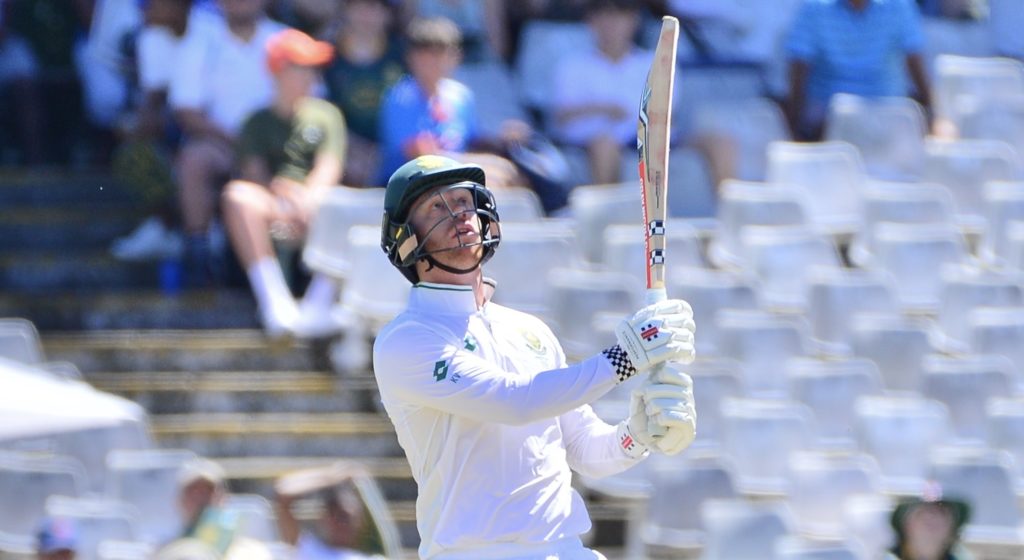The Newlands wicket exposed many Proteas batsmen as lacking adequate technique and temperament for a dogfight. This is Test cricket. It’s meant to be hard, writes RYAN VREDE.
When I started to write this column, 30 wickets had fallen in the Test at Newlands. It was not yet noon on day two.
Day one had seen 270 runs scored and 23 wickets fall in 75.1 overs, including the last six Indian sticks for zero runs.
Batting was hard, but certainly not impossible, as evidenced by Rohit Sharma, Shubman Gill, and Virat Kohli all bedding in, while Aiden Markram blended caution and aggression to remain unbeaten at the close of play.
Markram would carry that approach into day two, scoring his seventh and best century of his Test career.
Markram’s outside edge was beaten often, and he survived multiple lbw shouts after balls had jagged back viciously. But his technique, marked by a change of guard from off to middle stump, and temperament, defined by the ability to forget balls that beat him and stay focused on the next, endured, and provided a blueprint for what was possible.
WATCH: Markram’s sublime century
At the close of play on day one, South African pundits and Proteas batting consultant Ashwell Prince, lamented the wicket. However, the most notable offering on the issue came from Proteas captain Dean Elgar.
“I can’t say that because I’ve had success on wickets that have gone around. My record on our wickets has been pretty good,” Elgar said in response to being asked if the Cape Town pitch was “poor”.
“They have been challenging but I think that’s what you’ve got to experience as a batter. For me, it’s all about the balance between bat and ball and it’s a fine line to get it right. In South Africa, maybe they got it a little wrong and it’s in favour of the bowlers.
“But as a batter, you’ve still got to go out and apply yourself and you’ve got to really mentally hard on yourself to be disciplined, stay to a very simple game plan, and execute. There’s no excuse going forward. You still have to apply yourself, and that’s anywhere around the world. But particularly in South Africa where it is a little bit tougher.”
It was brutally honest from a player whose career has been defined by that quality.
The moaning would continue on the broadcast’s commentary on day two, with Shaun Pollock particularly brutal on the ground staff. Those same men were also glowing in their praise of Markram’s innings, characterising it in terms that should have given them, and those who’d attributed the poor batting entirely to the state of the pitch, a clue as to how to successfully navigate an innings.
Indeed, none of the Proteas’ wickets to fall on day two could be attributed to the pitch. There was a clutch of infuriating shots, not least of all Kyle Verreynne’s meek short-arm jab that floated to mid-on.
Markram needed a partner to match his technique and temperament. Instead, he got partner after partner who gifted India their wicket.
India then further countered the narrative by chasing the target in 12 overs at a run-rate touching seven.
In the wake of the seven-wicket defeat, the rookie South African batters will be acutely aware of how big the gap between South African domestic cricket and Test cricket is. It is safe to assume that you’ll get challenging wickets at domestic level. However, the quality of bowlers you’d face pales in comparison to an attack featuring Mohammed Siraj and Jasprit Bumrah. Flawed techniques aren’t exposed. Brittle temperaments, too.
Test cricket is the ultimate examination of both of these qualities and sometimes, like in Cape Town, they are required in extreme measures.
It is hard not to think about the societal shift to shy away from hard things as being central the outcry. A generation that has been fed a diet of T20 cricket, a format where results are determined more by talent than solid technique and granite temperament. Test cricket is hard in ways white-ball cricket can never be, and finding excuses for failures speaks to a frail mentality that doesn’t bode well for the future of this team.
Markram is an outlier for his performance, but his innings, and to a lesser extent, those of aforementioned India batters, challenged the victim mentality that has come to define this Test.
The Proteas Test side is laden with gifted rookies. But talent will never trump technique and temperament. If their ambition is to be an elite Test unit, and it should be, then finding ways to win under extremely challenging circumstances must be their goal.
REACTION: Newlands pitch required ‘more luck than skill’
Photo: Gallo Images







